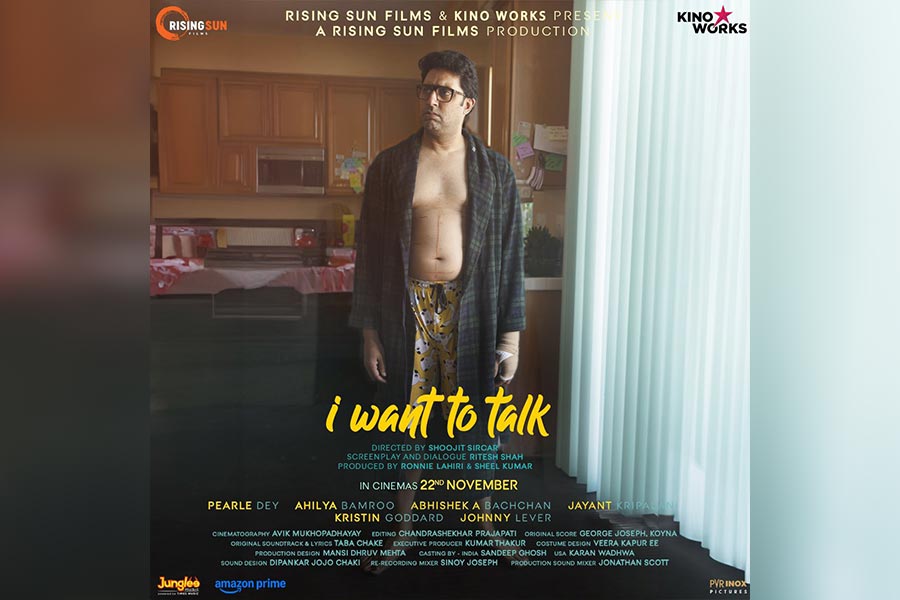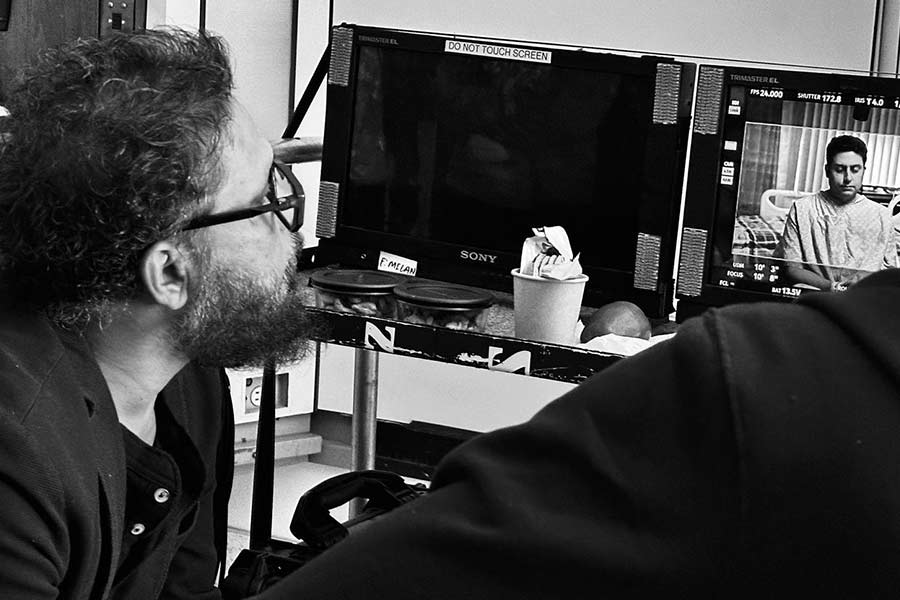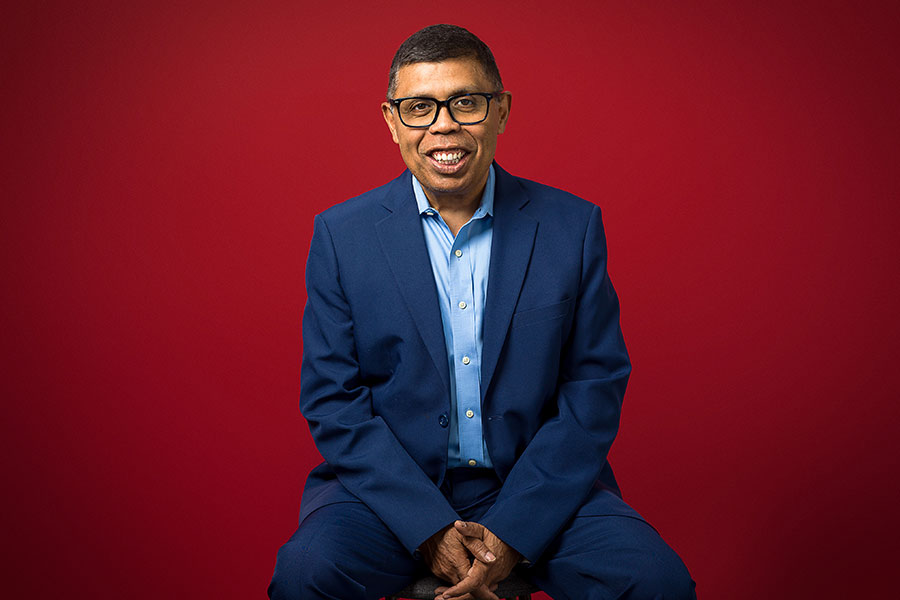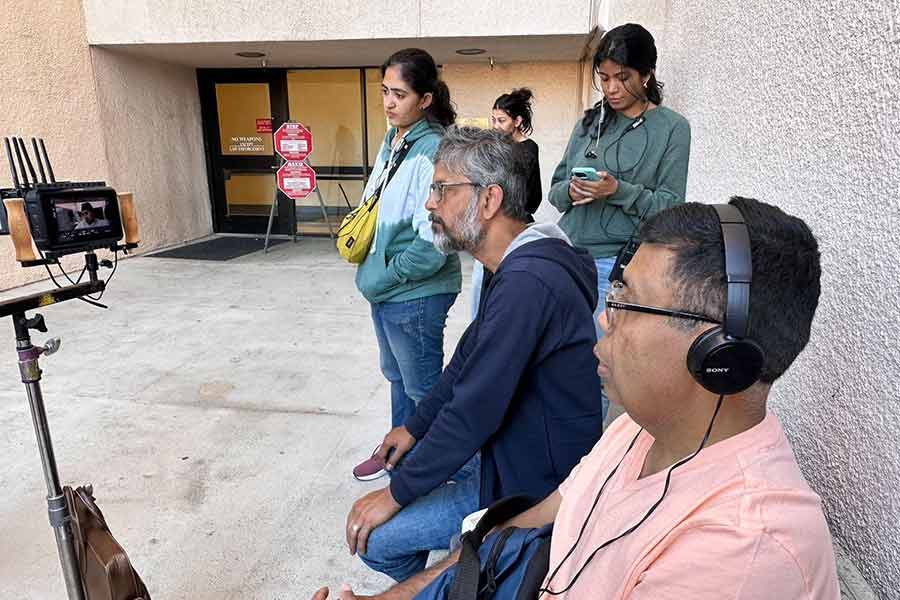Shoojit Sircar’s character brief to Abhishek Bachchan for his role as Arjun Sen in the film I Want To Talk was someone who has had a very tough life, but is still the funniest guy he knows. In real life, Arjun Sen, the marketing man, whose wife and daughter refuse to laugh at his jokes, has come up with a tagline for himself — Arjun Sen, world’s first sit-down comedian, who guarantees that one person will always laugh at his jokes. Him.
A branding and marketing guru, motivational speaker, author, podcast host, and cancer winner (“I don’t like the word ‘survivor’”), Sen is the man on whose extraordinary journey the film I Want To Talk is based. An aeronautical engineer from IIT Kharagpur, Sen got his MBA from BYU Provo, Utah, and had a successful career as a marketing executive in the US whose ability to talk, something he loved to do, was threatened by laryngeal cancer.
“My first report card in Montessori said ‘is a chatterbox, talks too much’. I’ve always loved to talk,” said Sen over an hour-long Zoom interview with My Kolkata, his wide smile every bit as infectious as his verve and positivity. Sen spent his IIT Kharagpur days participating in debates and Just-A-Minute, having determined that in a batch of 10 students he would always be among the first 10, even if he was at the bottom.

Abhishek Bachchan as Arjun Sen in Shoojit Sircar’s ‘I Want To Talk’
There are two things that strike you while watching the movie starring Abhishek as Arjun Sen. First is Sen’s resilience and second his ability to laugh and joke in the face of adversity. “Every time I went in for surgery I would joke with the anaesthetist because who knew if that was the last conversation I was having. My favourite joke was to ask them if on dates they said that their profession was knocking men and women out,” said Sen, for whom “attempted humour” was a deflection and survival tool.
Given 100 days to live, it was his resilience that saw him cross many 100 days since his diagnosis, not just surviving but thriving.

Shoojit Sircar on the sets of ‘I Want To Talk’ Arjun Sen
A story of resilience that had to be told
Sircar, in a blog post on Sen’s website, writes, “Over the last five years, I have admired another dimension of Arjun’s resilience; how he is stubborn and never gives up. I was intrigued by a man’s journey, who is simply going all out to stay alive, so one day he can dance at his daughter’s wedding.”
There are also two things that you don’t realise while watching the movie. First, Sen is a consummate storyteller, and second, for someone who likes to talk he also likes to listen. After the release of the film, Sen has been inundated with Facebook messages and he has been randomly calling some of them every day to hear their stories.
“Yesterday I spoke to an architect in Kolkata who wanted me to speak to his wife and his mother. It was the first time I was speaking to Mashima and she told me how she had been praying to pass away soon, but how after watching the film she felt five years younger and ready to run a marathon,” said Sen, who has many such stories of people who have reached out to him. People who want to share their stories, only if there is someone there to listen.
But he wasn’t expecting this kind of a response. In fact, he never had plans to share his story until Sircar came as a guest on his podcast show, Secrets to Win Big. “Something happened that day, we became friends. Covid came and Shoojit and I would talk regularly. And I told him the story. Not as a story but as something between two friends,” said Sen, talking about how the idea of the movie came about.
When Sircar said he wanted to tell a story of resilience and that he wanted to use this story as the medium, Sen went to one person to ask for permission to publicly share his story — his daughter Raka.
“My daughter had already gone through so much pain, which she did not sign up for — my health, divorce, financial challenge. Dragging her through that one more time seemed wrong,” said Sen. But Raka, who was then 27 years old, believed that his story needed to be told.

There are also two things that you don’t realise while watching the movie. First, Sen is a consummate storyteller, and second, for someone who likes to talk he also likes to listen
It is about the sherpas who saw him through
What he found hard to share, even with Sircar, was that, as shown in the film, Sen was, in fact, ready to give up. He spent four months planning his “exit”, as he called it, recording messages, buying gifts and sending ‘thank you’ notes to people in his life. His saviour came in the guise of Nancy, his nurse.
“She told me three things, two of which you see in the film. The biggest advice was this. She said, ‘Arjun, I know the headwind for you is very strong. But in life, when the headwind is very strong, if you can make a little effort, and take a U-turn, then the headwind becomes a tailwind. And then there will be no stopping you’.”
One of the scenes in I Want to Talk that brought tears to Sen’s eyes is the marathon where Abhishek struggled to reach the finish line and was helped by a police officer and his own daughter Raya.
Sen decided to sign up for the marathon, but he was about to go in for his bimax operation and knew he wouldn’t be able to run after such a big surgery. “When I reached the starting line with people around me all stretching their muscles, I did some math. It takes me 2,500 steps to cross one mile. If you multiply it by 26.2 miles, it’s nearly 65,500 steps. The moment I saw 65,500, right away I saw a billboard which said ‘impossible’. But then I told myself that I don't have to take 65,000 steps. I have to take one step. And my one reason was my daughter was waiting,” said Sen. Raka was 15 then.
Many people helped him finish that race. The policewoman who initially came to ask him to get on the sidewalk because the race was over, then drove in front of him so he didn’t fall over. The people who had finished the marathon came back to form a bubble around him, encouraging him to finish.
When his daughter came to him at the 21-mile mark, he gave up. But Raka wasn’t done. “She says, let’s do it. Let’s finish the race. That is where my resilience comes from. My story, the movie, is not about me not giving up, but people like Raka not giving up, Nancy not giving up. They are the sherpas who saw me through,” said Sen, making sure to point out that he is no superhuman. “I am very frail, very fragile. Deep inside I'm very scared. But when people around you, your sherpas don’t give up, that is when you become superhuman.”
A yes-extractor with good intent and best efforts

Sen (right) on the sets of ‘I Want To Talk’
Sen has used his marketing tips and tricks in his fight against cancer as well, devising an introduction for himself that made doctors he met remember him not just as a folder they put away after consultation but as a person, as an individual. “In marketing, what I've learned is there are three kinds of people or brands — one of many, which you ignore; one of few, which you notice but still ignore; and one of one, which is the one you take home,” said Sen, who made sure that he was ‘one of one’ to 70 per cent of his doctors, who gave him their cellphone numbers.
In his blog on Sen’s website, Sircar calls Arjun’s resilience and his never-give-up attitude manipulation. He writes, “In the film, I call it manipulation. But Arjun believes it is persistence, where he knows what he wants and goes all out to get it. Arjun did not like the word manipulation, but I explained to him that it was good manipulation, especially the way he manipulates and tricks his own body to not give up when facing constant adversities. I laughed when his marketing mind spun that to share that he is a ‘yes-extractor not a manipulator’, as he needs those yeses from those around him to live today and tomorrow.”
Sen wouldn’t disagree. What is important to him is the game ahead. “The very fact I'm talking to you today means I won the game yesterday. I have good intent, best efforts. And I live a life of no regrets. That’s my formula,” signed off Sen, knowing that every time he comes out of a doctor’s consultation, at least his mind will always be cancer-free and no one can take that from him.
